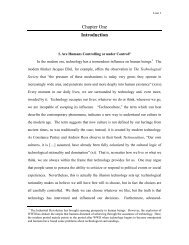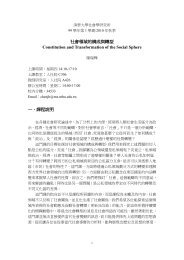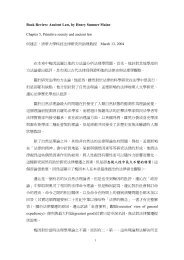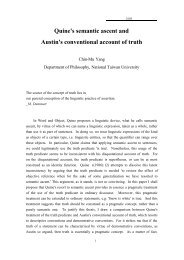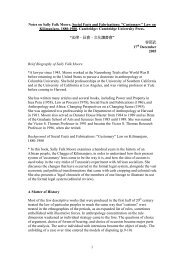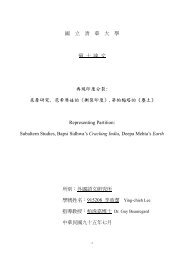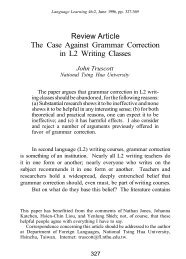Effects of Graded Texts on EFL College Students' Incidental ...
Effects of Graded Texts on EFL College Students' Incidental ...
Effects of Graded Texts on EFL College Students' Incidental ...
You also want an ePaper? Increase the reach of your titles
YUMPU automatically turns print PDFs into web optimized ePapers that Google loves.
score <str<strong>on</strong>g>of</str<strong>on</strong>g> 2. If a target word is used semantically correct but grammatically wr<strong>on</strong>g in<br />
a sentence, then a score <str<strong>on</strong>g>of</str<strong>on</strong>g> 4 was given. If a sentence is c<strong>on</strong>structed with a target<br />
word used correctly in both semantic and grammatical aspects, then this word was<br />
credited with a score <str<strong>on</strong>g>of</str<strong>on</strong>g> 5. For sentence judging, two raters were employed and<br />
scores that they graded were averaged to achieve inter-rater reliability. The<br />
Self-report Categories were translated into learners’ native language, Chinese, for<br />
learners to fully understand how to do this test (see Appendix C).<br />
The VKS posttest c<strong>on</strong>sisted <str<strong>on</strong>g>of</str<strong>on</strong>g> the 50 target words tested in the pretest. Based<br />
<strong>on</strong> the above VKS scoring system, each learner had a score for each target word <strong>on</strong><br />
their posttest. A real VKS scoring example is shown in Appendix D. The scores in<br />
the posttest were analyzed for two purposes. First, to measure learners’ vocabulary<br />
gain after they were exposed to the <strong>on</strong>-line extensive reading syllabus. Sec<strong>on</strong>d, to<br />
determine the relati<strong>on</strong>ship <str<strong>on</strong>g>of</str<strong>on</strong>g> exposure <str<strong>on</strong>g>of</str<strong>on</strong>g> target words and the quality <str<strong>on</strong>g>of</str<strong>on</strong>g> vocabulary<br />
learning (receptive or productive word knowledge).<br />
3.4.3 Questi<strong>on</strong>naires<br />
Questi<strong>on</strong>naires <str<strong>on</strong>g>of</str<strong>on</strong>g> three kinds were c<strong>on</strong>structed for investigating into<br />
participants’ background and their attitudes towards extensive reading. The<br />
questi<strong>on</strong>naires were written in participants’ native language, Chinese, in order to<br />
prevent participants’ limited English ability from affecting their answers.<br />
The first questi<strong>on</strong>naire, the Background Questi<strong>on</strong>naire, intends to obtain<br />
informati<strong>on</strong> <strong>on</strong> learners’ use <str<strong>on</strong>g>of</str<strong>on</strong>g> computer and internet (the 1 st to 8 th item), their<br />
perspectives <strong>on</strong> English learning (the 9 th to 12 th item), and their experiences <str<strong>on</strong>g>of</str<strong>on</strong>g><br />
extensive reading (13 th to 17 th item) (See Appendix A). The other two questi<strong>on</strong>naires,<br />
the Online Evaluati<strong>on</strong> Questi<strong>on</strong>naire and In-class Evaluati<strong>on</strong> Questi<strong>on</strong>naire, were<br />
designed to probe into participants’ percepti<strong>on</strong>s <strong>on</strong> the <strong>on</strong>-line extensive reading<br />
48



